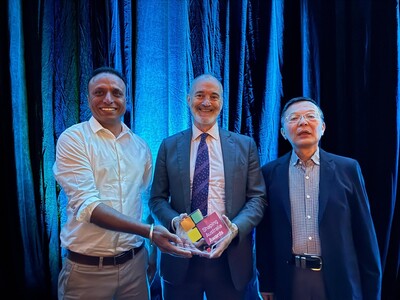This post was originally published on Sustainability Matters

RMIT University’s coffee concrete inventors have won an award at Universities Australia’s Shaping Australia Awards in the ‘Problem Solver’ category.
Australia generates around 75,000 tonnes of ground coffee waste annually, contributing to 6.87 million tonnes of organic waste in landfills. This waste accounts for 3% of the nation’s greenhouse gas emissions.
The coffee innovation, made by Dr Rajeev Roychand, Professor Jie Li, Associate Professor Shannon Kilmartin-Lynch, Dr Mohammad Saberian, Professor Guomin (Kevin) Zhang and Professor Chun Qing Li, strengthens concrete by 30% using biochar made from spent coffee grounds, reducing this waste going to landfill. The coffee biochar can replace a portion of the sand that is used to make concrete.
Roychand and Li received the Problem Solver 2024 People’s Choice Winner award on behalf of the team at Parliament House in Canberra. Roychand, the lead inventor of the coffee concrete, said the team was thrilled to win the award.
“Winning this national award is outstanding recognition of our vision to transform waste materials into valuable construction resources,” said Roychand, from the School of Engineering.
“What began as research into coffee grounds has now evolved into a comprehensive program converting various types of organic waste into biochar that could help reshape the environmental footprint of the built environment.”
Dr Rajeev Roychand (left) and Professor Jie Li (right) celebrate their national research award with RMIT Vice-Chancellor Professor Alec Cameron at Parliament House in Canberra. Image: Supplied.
Within a year, the team progressed from the lab to real-world applications with industry and government partners, including a footpath trial in Gisborne, Victoria.
The team’s coffee concrete is also being used in Victoria’s ‘Big Build’ projects and is displayed in Germany’s prestigious Futurium museum as an innovative material for a sustainable future.
Li said their research advanced sustainable construction, enabling the transformation of diverse organic waste streams into high-performance construction materials.
“This Australian-led innovation demonstrates how we can pioneer solutions for global environmental challenges,” Li said.
Kilmartin-Lynch, a proud Taungurung man from Mansfield in Victoria, was at RMIT when the School of Engineering team conducted this research and is now at Monash University.
“By integrating the circular economy with advanced materials engineering, we’re creating new pathways for reducing carbon emissions while enhancing structural performance,” said Kilmartin-Lynch.
Saberian said their innovation came at a crucial time with global sand demand projected to rise by 45% over the next four decades.
“We’re not only addressing waste management but also helping preserve this increasingly scarce natural resource that is vital for construction worldwide,” Saberian said.
Following the success of the research, the team has expanded its collaboration with industry leaders both locally and internationally, including RMIT’s partnership with Ambiolock in Australia and C-Green in Sweden.
‘Transforming spent coffee grounds into a valuable resource for the enhancement of concrete strength’ is published in the Journal of Cleaner Production.
Image caption: Coffee biochar for concrete.





0 Comments